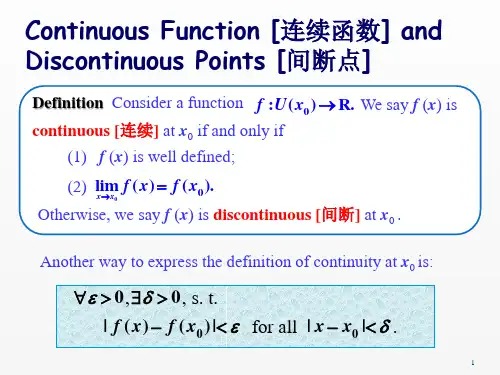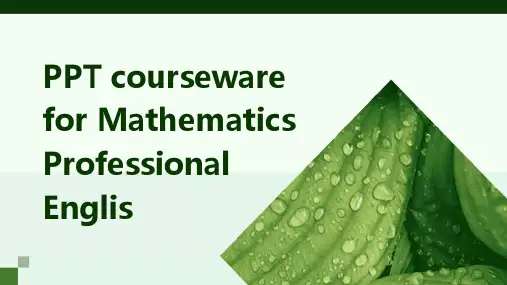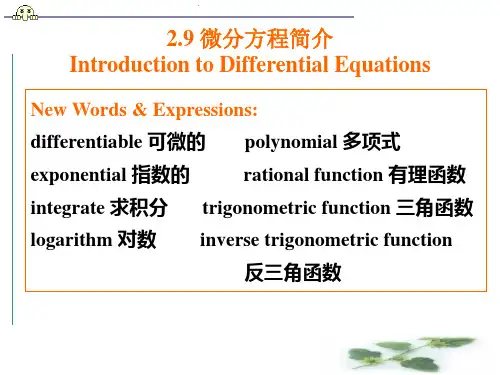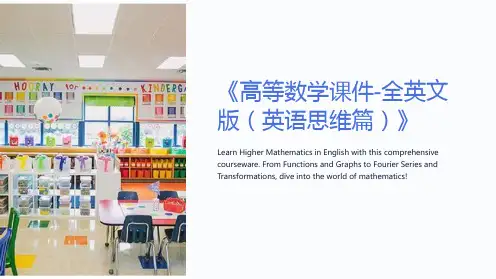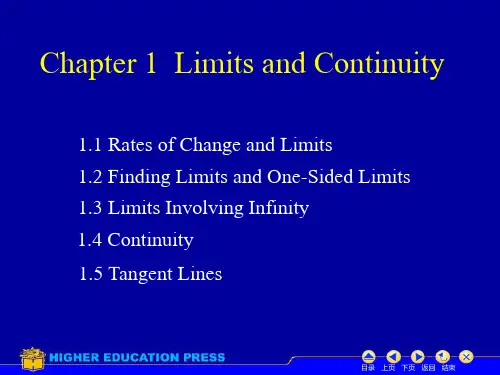数学专业英语之课件一
- 格式:ppt
- 大小:275.00 KB
- 文档页数:7

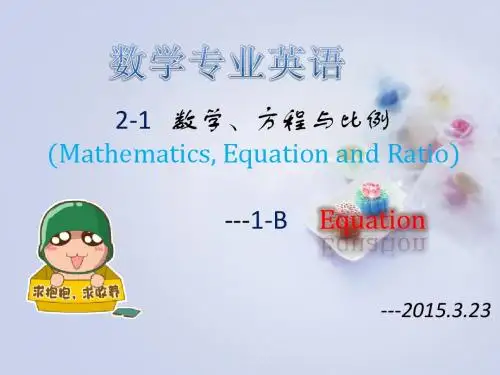
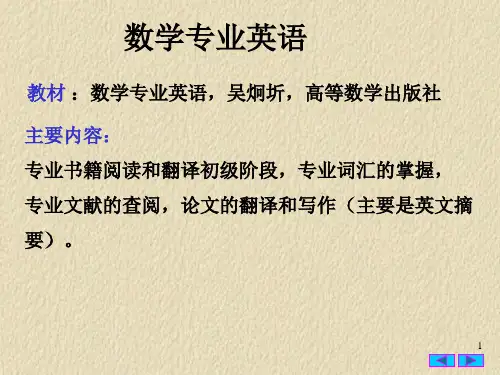
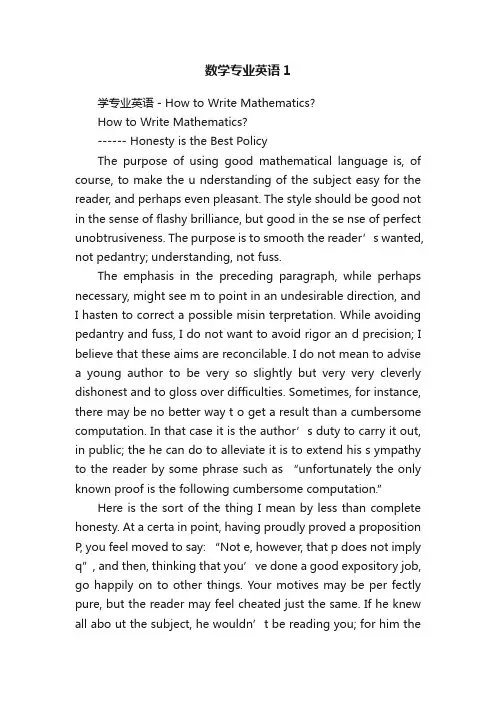
数学专业英语1学专业英语-How to Write Mathematics?How to Write Mathematics?------ Honesty is the Best PolicyThe purpose of using good mathematical language is, of course, to make the u nderstanding of the subject easy for the reader, and perhaps even pleasant. The style should be good not in the sense of flashy brilliance, but good in the se nse of perfect unobtrusiveness. The purpose is to smooth the reader’s wanted, not pedantry; understanding, not fuss.The emphasis in the preceding paragraph, while perhaps necessary, might see m to point in an undesirable direction, and I hasten to correct a possible misin terpretation. While avoiding pedantry and fuss, I do not want to avoid rigor an d precision; I believe that these aims are reconcilable. I do not mean to advise a young author to be very so slightly but very very cleverly dishonest and to gloss over difficulties. Sometimes, for instance, there may be no better way t o get a result than a cumbersome computation. In that case it is the author’s duty to carry it out, in public; the he can do to alleviate it is to extend his s ympathy to the reader by some phrase such as “unfortunately the only known proof is the following cumbersome comp utation.”Here is the sort of the thing I mean by less than complete honesty. At a certa in point, having proudly proved a proposition P, you feel moved to say: “Not e, however, that p does not imply q”, and then, thinking that you’ve done a good expositor y job, go happily on to other things. Your motives may be per fectly pure, but the reader may feel cheated just the same. If he knew all abo ut the subject, he wouldn’t be reading you; for him thenonimplication is, qui te likely, unsupported. Is it obvious? (Say so.) Will a counterexample be suppl ied later? (Promise it now.) Is it a standard present purposes irrelevant part of the literature? (Give a reference.) Or, horrible dictum, do you merely mean th at you have tried to derive q from p, you failed, a nd you don’t in fact know whether p implies q? (Confess immediately.) any event: take the reader into y our confidence.There is nothing wrong with often derided “obvious”and “easy to see”, b ut there are certain minimal rules to their use. Surely when you wrote that so mething was obvious, you thought it was. When, a month, or two months, or six months later, you picked up the manuscript and re-read it, did you still thi nk that something was obvious? (A few months’ripening always improves ma nuscripts.) When you explained it to a friend, or to a seminar, was the someth ing at issue accepted as obvious? (Or did someone question it and subside, mu ttering, when you reassured him? Did your assurance demonstration or intimida tion?) the obvious answers to these rhetorical questions are among the rules th at should control the use of “obvious”. There is the most frequent source o f mathematical error: make that the “obvious”is true.It should go without saying that you are not setting out to hide facts from the reader: you are writing to uncover them. What I am saying now is that you should not hide the status of your statements and your attitude toward them eit her. Whenever you tell him something, tell him where it stands: this has been proved, that hasn’t, this will be proved, that won’t. Emphasize the importan t and minimize the trivial. The reason saying that they are obvious is to put t hem in proper perspecti e for the uninitiated. Even if your saying so makes an occasional readerangry at you, a good purpose is served by your telling him how you view the matter. But, of course, you must obey the rules. Don’t le t the reader down; he wants to believe in you. Pretentiousness, bluff, and conc ealment may not get caught out immediately, but most readers will soon sense that there is something wrong, and they will blame neither the facts nor them selves, but quite properly, the author. Complete honesty makes for greatest clar ity.---------Paul R.Haqlmosvocabularyflashy 一闪的 counter-example 反例unobtrusiveness 谦虚dictum 断言;格言forestall 阻止,先下手deride嘲弄anticipate 预见 subside沉静pedantry 迂腐;卖弄学问 mutter出怨言,喃喃自语fuss 小题大做 intimidation威下reconcilable 使一致的 rhetorical合符修辞学的gloss 掩饰 pretentiousness自命不凡alleviate 减轻,缓和bluff 欺骗implication 包含,含意concealment隐匿notes1. 本课文选自美国数学学会出版的小册子How to write mathematics 中Paul R.Halmos. 的文章第9节2. The purpose is smooth the reader’way, to anticipates his difficulties and to forestall them. Clarit y is what’s wanted, not pedantry; understanding, not fuss.意思是:目的是为读者扫清阅读上的障碍,即预先设想读者会遇到什么困难,并力求避免出现这类困难。
